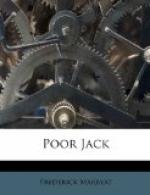Sir Hercules and Lady Hawkingtrefylyan quitted Greenwich the day after the interview narrated in the preceding chapter; and by that day’s post Anderson received a letter, in reply to the one he had written, from his friend Philip Bramble, channel and river pilot, who had, as he said in his letter, put on shore at Deal, where he resided, but the day before, after knocking about in the Channel for three weeks. Bramble stated his willingness to receive and take charge of me, desiring that I would hold myself in readiness to be picked up at a minute’s warning, and he would call for me the first time that he took a vessel up the river. A letter communicating this intelligence was forthwith dispatched by my mother to Sir Hercules, who sent a short reply, stating that if I conducted myself properly he would not lose sight of me. This letter, however, very much increased the family consequence in Fisher’s Alley, for my mother did not fail to show it to everybody, and everybody was anxious to see the handwriting of a real baronet.
About a week afterward I went to the shop of the widow St. Felix to purchase some tobacco for my father, when she said to me, “So, Jack—or Tom—as I hear you request to be called now—you are going to leave us?”
“Yes,” replied I, “and I shall be sorry to leave you, you have been so kind to me.”
“A little kindness goes a great way with some people, Tom, and that’s the case with you, for you’ve a grateful heart. You’re to be a pilot, I hear; well, Tom, I’ve a present to make you, which you will find very useful in your profession, and which will make you think of me sometimes. Stop a moment till I come down again.”
The widow went upstairs, and when she came down held in her hand a telescope, or spy-glass, as sailors generally call them. It was about two feet long, covered with white leather, and apparently had been well preserved.
“Now, Tom, this is what a pilot ought not to be without, and if what was said by the person to whom it belonged is true, it is an excellent spy-glass; so now accept it from your loving friend, and long may you live to peep through it.”
“Thank you, thank you,” replied I, delighted, as Mrs. St. Felix put it into my hands. I surveyed it all over, pulled out the tube, and then said to her, “Who did it belong to?”
“Tom,” replied the widow, “that’s a sad trick you have of asking questions; it’s quite sufficient that it is mine, and that I give it to you—is it not?”
“Yes,” replied I, “but you’re the only person who says that I ask too many questions. Why, here’s a name, F.I.”
The widow stretched herself over the counter with a sudden spring, and snatched the telescope out of my hand. When I looked at her she stood pale and trembling.
“Why, what is the matter?” inquired I.
She put her hand to her side, as if in great pain, and for some seconds could not speak.




